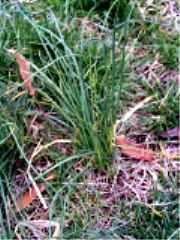Vol.
2 # 111
March 16, 2001
Wild
Onions & Garlic In The Lawn
 It's springtime and the wild onions are taking over the lawn at this point.
Onions and garlic grow upright and at a much more rapid rate than grass,
making them quite conspicuous. For those striving for the perfect
lawn, onions can be the "bane" of their existence. Not only are these
weeds profuse, they are extremely difficult to control. Organic gardeners
can only pull out the old dandelion digger. Folks who use herbicides
face a difficult task.
It's springtime and the wild onions are taking over the lawn at this point.
Onions and garlic grow upright and at a much more rapid rate than grass,
making them quite conspicuous. For those striving for the perfect
lawn, onions can be the "bane" of their existence. Not only are these
weeds profuse, they are extremely difficult to control. Organic gardeners
can only pull out the old dandelion digger. Folks who use herbicides
face a difficult task.
Onions and garlic have similar characteristics and present the same control
problems, even though they are different species. The onion has a
hollow, round leaf and a strong onion scent when crushed. The garlic
has a flat leaf which is not hollow, and the plant's odor is not strong
like an onion. The emerged onion plant is displaying only a small
percentage of the subterranean bulbets. Digging up all of the bulbs
can eliminate your problems. Spraying with herbicides will reduce
the number of bulbs, but it will not kill all of the bulbs. Onions
and garlic also spread from seed, so make sure they are not allowed to
grow tall enough to form a seed head.
An onion has natural defense mechanisms. Its foliage stands erect
and the outer coating of the leaf is thick and waxy. Herbicides are
systemic, meaning they are absorbed into the vascular system of the plant.
Generally, they cause an elongation of the cell walls through accelerated
growth, causing a collapse of the plant and ultimate death. Liquid
herbicide applied to an onion beads and rolls quickly off the leaves without
being absorbed. the herbicide which does adhere does not penetrate
the waxy wall, so results are still poor.
Efforts to kill onions with a selective broadleaf weed killer should be
carried out about 2 days after mowing. The mower wounds the cell
walls, giving the herbicide an entrance. A "spreader sticker" or
some dish washing detergent (1 drop per gallon) will break down the surface
tension of the spray, allowing it to spread and cover the foliage.
Granular application should also be done shortly after cutting, applied
to moist grass for the purpose of adhesion.
Most herbicides used on onions contain derivatives the selective broadleaf
herbicide "2-4,D", which kills broadleaf weeds, but does not harm
turf grass. "RoundUp" is a non selective meaning that it kills everything
including grass, but onions and garlic are two of the few plants which
RoundUp has no effect upon. A new selective broadleaf weed
killer called Confront is much more effective on all broadleafs
including onions and garlic, because it works from the roots as well as
systemically.
This column is not very organically oriented, but for those who choose
to slay the onions, it helps to know what you are up against. Another
method of bruising the tops prior to spraying would be to practice your
golf swing with a driver. The onions would be wounded, but your neighbors
might be a bit concerned about your behavior. See you next week.
Andy Lynn
 It's springtime and the wild onions are taking over the lawn at this point.
Onions and garlic grow upright and at a much more rapid rate than grass,
making them quite conspicuous. For those striving for the perfect
lawn, onions can be the "bane" of their existence. Not only are these
weeds profuse, they are extremely difficult to control. Organic gardeners
can only pull out the old dandelion digger. Folks who use herbicides
face a difficult task.
It's springtime and the wild onions are taking over the lawn at this point.
Onions and garlic grow upright and at a much more rapid rate than grass,
making them quite conspicuous. For those striving for the perfect
lawn, onions can be the "bane" of their existence. Not only are these
weeds profuse, they are extremely difficult to control. Organic gardeners
can only pull out the old dandelion digger. Folks who use herbicides
face a difficult task.